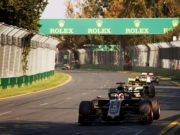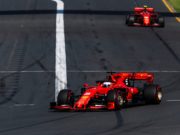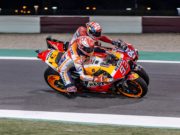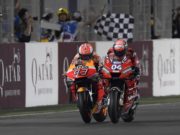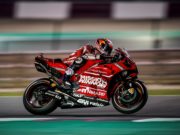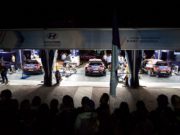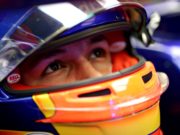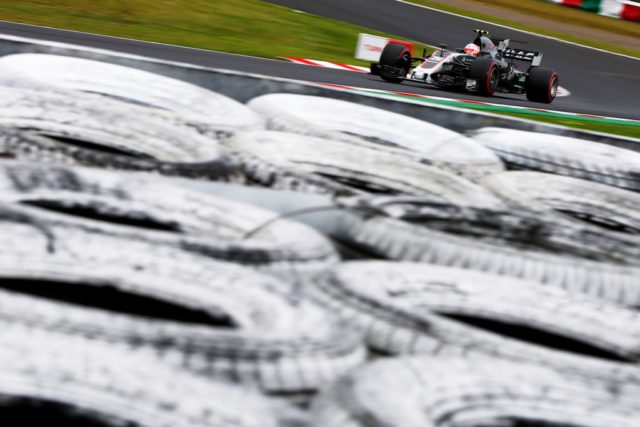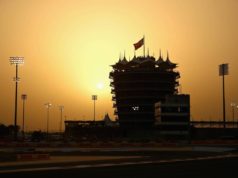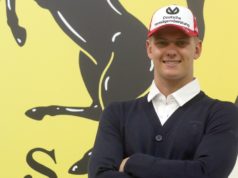The Haas F1 Team arrives for its home Grand prix – the Formula 1 round in the United States of America. The race is held at the Circuit of the Americas in Austin. Team principal Guenther Steiner explains how the team worked during the last race weekends and what the updates for COTA are.
The Far East swing involved plenty of highs and lows for Haas F1 Team. You had to overcome two crashes – one in Malaysia and another in Japan – yet you came away with a total of seven points to regain seventh in the constructors’ standings. Talk about how the team handled that adversity and then delivered when it was time to race.
“Two of the three weekends we came away with points, which is always what we go for. For sure we made our job difficult with having crashes in the free practice sessions – that doesn’t help. But what we have proven is that the mechanics in the garage can handle it. For sure, they would rather not change all the parts on the car into the night, but it was done diligently. The cars had no issues when they went racing. They were in very good shape. Coming away with points in two out of three races was a success. It’s very tough, and to hold onto seventh in the constructors’ standings will be very challenging. We will not give up. We will fight for it.”
Were those points finishes more gratifying for the crew, knowing how far they had to come to get that kind of result?
“Absolutely. These are people who have been doing this a long time, and they know it happened because of them. Everybody stands behind them and are proud of what they did.”
Japan was obviously the high point of the Far East swing with a double-points finish. How important was that result as the team heads into its home race – the United States Grand Prix?
“It’s always motivating. What these guys work for is success. For us, success is to be scoring points. We scored with two cars for the second time since we entered Formula One, which is less than two years. Everybody is pumped up and now we come to the United States, the home country of Haas F1 Team. For sure it’s motivating and everybody wants to keep it going.”
Japan’s Suzuka Circuit has been a strong venue for Haas F1 Team. It was the first track where you got both cars into Q3, and it was the scene of the team’s second double-points finish. How does that track seemingly play to Haas F1 Team’s strengths?
“Our car, last year and this year, is very good on technical circuits with high-speed corners. Maybe there’s a little bit of luck, as well. I would say Suzuka is one of the most, if not the most technical track on the calendar. A lot of the car needs to be good, and the drivers need to perform at a high level. It came together twice in the two years we’ve been there.”
How do you attempt to transfer a strong finish in Japan to another strong finish at COTA?
“There is no recipe to that one. We just go out in FP1, see where we are, and go from there. As I always say, to make predictions this year, in the midfield, is impossible. Nobody can predict it. People wrote us off after Malaysia. They said we’d scored the last of our points this year. Then we came back in Japan with two cars in the points. Anything can happen. It doesn’t depend only on how we are doing, but how good the other teams are. That’s obvious, but by being so tight, anything can happen. Last year we scored a point at COTA and we’ll try to do better this year.”
You’ve said previously that some upgrades to the Haas VF-17 were planned for COTA. What are they?
“It’s the last upgrade for our car this year. The modifications are on the bargeboard sides and on the floor of the car. It’s easily recognizable when you see the car what has changed.”
For an upgrade, how long is the process from original idea to when it becomes reality and is bolted onto the race car?
“It depends what the upgrade is. It depends on how big it is and how intricate it is to make the parts. Sometimes you find something that is better, but it’s not efficient to do it, so you wait until you’ve got more stuff to put on the car. It can vary from one month to three months.”
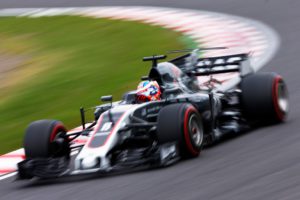 Even as development work on teams’ 2017 cars has stopped, the midfield seems as competitive as ever. Is this due to teams fine-tuning what they have? If so, where can gains be made during this last stretch of races?
Even as development work on teams’ 2017 cars has stopped, the midfield seems as competitive as ever. Is this due to teams fine-tuning what they have? If so, where can gains be made during this last stretch of races?
“To find the right setup and to get the tires to work. All this year, to get the tires to work has been the most important thing. That’s what we’ll be focusing on.”
How important is the United States Grand Prix to Haas F1 Team and to Formula One’s recognition in America?
“COTA is a very recognized race. Everybody likes it within Formula One. They have good ticket sales – more than a quarter of a million attending – which is fantastic. The track is very exciting. There is nothing bad to say about COTA. It has added something very good to the calendar by being present again in the United States, which is still the biggest economy in the world. I think everybody looks to come here, and a lot of people look forward to watching it on TV.”
Would you like to see another Formula One race in America?
“Sure, I’d love all the races to be in America. It would be less travel! Obviously, we cannot have that, but one or two, I think there is space for that. It should be in a big city where there’s a big population and where there’s a good fan base. Miami, Los Angeles and New York would be fantastic places, even Las Vegas could work. I don’t think there is a shortage of good places to go to. It’s more where can we get it done as soon as possible.”
Would another Formula One race in America accentuate or take away from COTA’s presence in Formula One?
“There is enough of a market to have a second race in the United States. It’s a big country. As long as it’s not close to Austin, I think it would work.”
Austin has become a destination venue for the Formula One industry, much like Singapore and Monaco. Why does the city resonate so well with those in Formula One?
“I just think it’s a cool city. There’s a lot of stuff you don’t have anywhere else. It’s not like just any other city we go to. It’s a cool city with a good vibe. People like it there. The climate is good, the racetrack is good and the facilities are nice. That’s why everybody loves going to Austin.”
It was announced that 2017 will be NBC’s last year broadcasting Formula One in the United States before ESPN takes over in 2018. NBC has broadcasted Formula One content exclusively since 2013 and played an integral part in promoting Haas F1 Team’s debut last year. Can you sum up your thoughts on NBC’s contributions to the growth of Formula One in America?
“When you see somebody go – somebody who did a good job and helped us grow – it’s sad. NBC has been supportive of us and believed in us and we have a great relationship with all their team. They know what they’re talking about – they’re experts. It’s sad to see people, or companies, go somewhere else. On behalf of Haas F1 Team, I’d like to thank everybody involved in it, from the producers, cameramen, the reporters and commentators – they helped us a lot.”
#Haastin training & ?? sightseeing all in one! https://t.co/0W5AFIyGy0
— Haas F1 Team (@HaasF1Team) October 14, 2017





